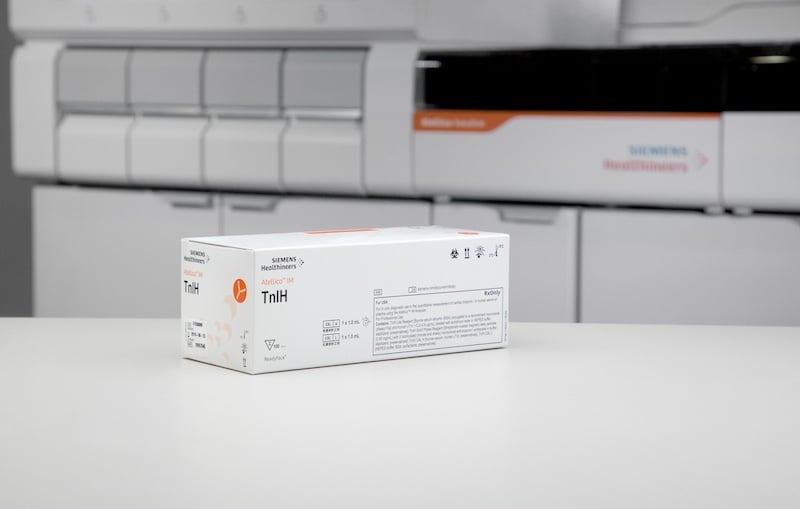By Chris Wolski
One-sentence summary:
A new high-sensitivity troponin test from Siemens Healthineers not only diagnoses heart attacks but also predicts a patient’s risk of future cardiac events up to a year in advance.
Three brief takeaways:
- Prognostic value: The Atellica IM High-Sensitivity Troponin I Assay now helps predict a patient’s risk of major adverse cardiac events (MACE) within a year.
- Patient interest: 67% of surveyed Americans want to know their heart attack risk, and most would make lifestyle changes if informed.
- Healthcare impact: Early risk identification can prompt timely care and reduce long-term healthcare costs and complications.
According to a recent survey conducted by YouGov on behalf Siemens Healthineers—Americans are worried about their risk of a heart attack. The survey found that 49% of respondents are worried a loved one will have a heart attack in the near future and about a third (34%) are just as worried about their own risk.
Troponin testing, which is a primary indicator of whether a patient is actually presenting with a heart attack, is the diagnostic gold standard. While its lifesaving properties at the time of a heart attack are unquestionable, Siemens Healthineers has broadened its value with its Atellica IM High-Sensitivity Troponin I Assay, which has added a prognostic claim to the lifesaving test.

According to Ian Lentnek, MD, cardiologist, and medical affairs director at Siemens Healthineers, the prognostic claim is a game changer.
“Put simply, the test helps support doctors in determining initial heart attack diagnosis and whether a patient may be likely to return with certain MACE-types of cardiac issues: they may be in immediate danger, or imminent danger or at risk of death,” he explains. “We can use this information to talk about what a patient’s risk would be for up to one year.”
Assessing Heart Attack Risk One Year Out
Lentnek notes that about 90% of patients who present to an ED with “heart attack” symptoms are not having a cardiac event, but could be at risk of one.
The prognostic ability of the Atellica IM High-Sensitivity Troponin I Assay is certainly something that dovetails with the desires of patients. According to the same YouGov survey, 67% of respondents said they’d want to know if they were at risk of having a heart attack within a year, and 75% said they’d use this knowledge to make lifestyle changes, including either through medication or exercise.
“Americans have a growing interest in information about their health that they can act on,” says Lentnek. “This data helps emphasize to at-risk patients the importance of seeking follow-up care. This is especially important because receiving follow-up care may not be prioritized or may be difficult for patients. This clinical data can help emphasize the importance of prioritizing their follow-up care.”
Troponin Provides Window on MACE-Related Risks
More importantly, the Atellica IM High-Sensitivity Troponin I Assay can help identify patients’ MACE-related risks. Because the test is non-invasive and has good turnaround time, it gives patients and clinicians an important benefit time—time to act and time to reduce the risk that the patient will experience a major adverse cardiac event. This knowledge could also have profound results related to costs across the healthcare continuum.
“If we can learn this risk information sooner, we’re potentially helping to offset an entire cascade of costs—not just on the patient side, but also on the hospital side as well,” explains Lentnek. “For some patients, this risk information might be the motivation they need to work toward reducing their risk with lifestyle modifications. For other at-risk patients, we’d want to emphasize the importance of follow-up care, and that they’d need to be back to the hospital as soon as possible if symptoms begin to potentially help improve their outcome.”
According to Lentnek, irreversible heart muscle damage begins within 30 minutes of an event, so knowing their risk allows the patient and their caregivers to react quickly if a MACE-related event occurs.
Troponin is only one of many biomarkers that may be available to clinicians and labs. Lentnek notes we’re in a time of “discovery,” so more prognostic testing may be available in the coming years.
The Atellica IM High-Sensitivity Troponin I Assay is currently available.
Chris Wolski is chief editor of CLP.
Featured Image: Siemens Healthineers has broadened the value of troponin testing with its Atellica IM High-Sensitivity Troponin I Assay, which has added a prognostic claim to the lifesaving test. Image: Siemens Healthineers





